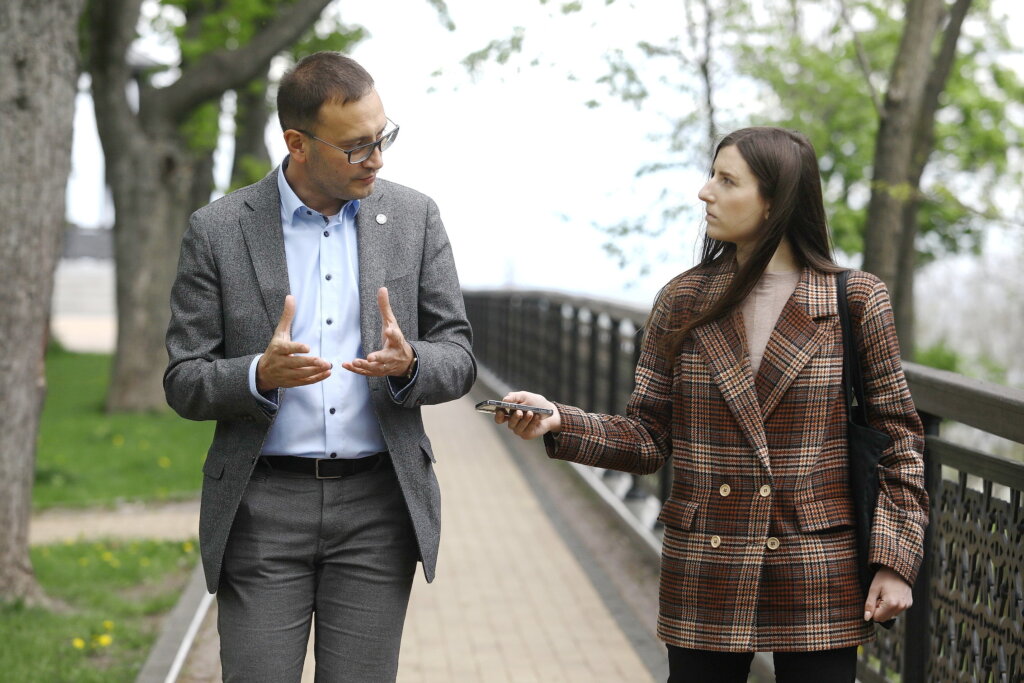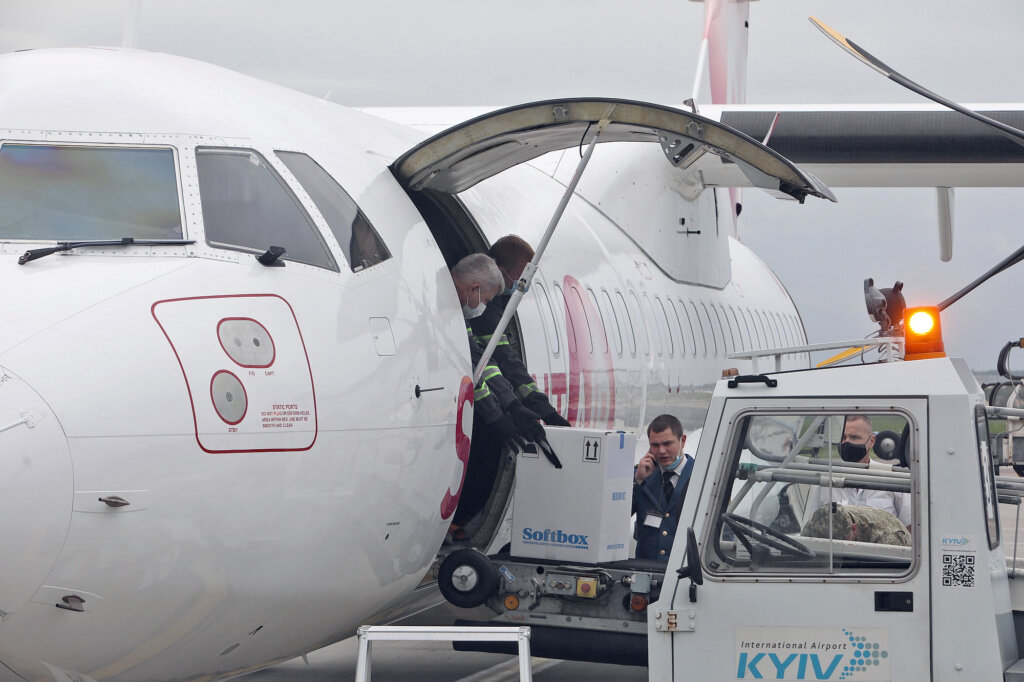Ukraine has had one of the weakest responses to the coronavirus pandemic in the world.
Its vaccination campaign, whose start date was delayed by two months, is crawling along at a snail’s pace. Only 2.4% of Ukrainians have gotten their first dose and less than 1% have been fully vaccinated. At this rate, it will take years to inoculate the whole population.
Can Ukraine do better? Jarno Habicht, the head of the World Health Organization’s office in the country, thinks it can.
“I really hope that we can kind of scale-up,” Habicht said. “I am very, very optimistic.”
Ukraine’s new Health Minister Viktor Lyashko promised to provide vaccine jabs to 5 million more Ukrainians by September. Today, about 1 million have gotten their first dose.
Lyashko’s plan is less ambitious than the National Vaccination Plan, which called for vaccinating 2.8 million people per month starting in April. But it still ran into a skeptical parliament, which saw it as unrealistic.
Ukraine’s main stumbling block is insufficient vaccine supplies, Habicht believes. As of May 27, Ukraine has received 3.5 million doses of the vaccine, 1.1 million of which have already been used up.
Habicht believes Ukraine will be able to accelerate the vaccination drive in June, as more doses arrive.
Ukraine is expecting to receive 19 million doses of the Pfizer/BioNTech vaccine on top of the 117,000 doses that arrived this week. NovaVax will supply 10 million doses to Ukraine and 1.5 million more doses will come from AstraZeneca.
COVAX, the global coronavirus vaccine alliance, will provide Ukraine with 16 million doses, almost 960,000 of which have already been delivered.
And multiple counties and organizations agreed to share vaccines with Ukraine or fund their purchase. They include Poland, Lithuania, and the World Bank.
Ukraine’s response
Ukraine was slow partly because it fell victim to “vaccine diplomacy,” Habicht said. He believes it’s not Ukraine’s fault that some deliveries have been halted, like the AstraZeneca vaccines from India’s Serum Institute. India stopped exports in late April to meet domestic demand, which means Ukraine only got 500,000 out of the 2 million it ordered.
“I think Ukraine has been under pressure because, looking at the neighboring European Union countries who started their vaccination programs two months before, I think, generated a lot of expectations to start earlier. And the vaccines became available only at the end of February,” Habicht said.
The WHO representative believes Ukraine’s authorities did a good job under the circumstances.
“I think everybody has been criticized. There have been those who do not want to get vaccinated — they are criticized, and those who do not provide care fast enough – they are, too. And I think it is the same with the Ministry (of Health),” Habicht said.

Jarno Habicht, the World Health Organization representative and head of country office to Ukraine, speaks to the Kyiv Post in central Kyiv on May 13, 2020.
The representative complimented the vaccination plan, first created in January and updated in mid-April, in which Ukraine committed itself to give 47 million shots by the end of the year.
He also welcomed the launch of mobile vaccination teams, the pending introduction of community mental health services and the idea to use leftover vaccines on patients.
However, he acknowledged that there were failures, such as the decision to give leftover vaccines exclusively to celebrities and opinion leaders. This project ended after a few weeks.
“It was not reaching the target group at the time, which were the health care workers who needed to get protected so that they could continue to provide care as well as the other frontliners in the list,” he said.
Habicht also criticized the government’s decision to spend the COVID-19 fund on road construction and production of patriotic movies.
“If the government has allocated funds to health, I would always like to see actually it goes to the health sector,” Habicht said.
Leaving no one behind
Demand for vaccines is rising, according to new WHO research.
“We see actually that many of those who were not interested in vaccination, have become interested in the past months,” Habicht said.
According to him, the proportion of willing Ukrainians increased from 48% in March to 54% by the end of April.
“There is potential to have even more Ukrainians interested in vaccination because there are those whose friends and families are getting vaccinated,” Habicht said.
In fact, the WHO found that people in Ukraine have a higher level of interest in vaccination than the average in Europe.
According to Habicht, the next task for the government is to ensure that everyone who wants a shot has access to it. This means taking into account people’s special needs, such as transportation.
“They might not have means… might not have resources for the transport, they have not been reached out to, they might not read the digital media. And then they might have questions,” he added.
According to Habicht, Ukraine should focus on making vaccines accessible even to remote populations.
“We see from preliminary data, more than 5% (of the population over the age of 60) in Kyiv Oblast and Kyiv city are already getting vaccinated with the first dose — a very good result. But in some oblasts, it’s around 1%,” Habicht said.
According to the Health Ministry’s website, Luhansk and Chernivtsi Oblasts gave the fewest number of shots while the capital city administered five times as much.
“It is important that we ensure equity across all oblasts,” he said, “We cannot leave pockets of unvaccinated people.”

Workers unload the batch of the Pfizer/BioNTech COVID-19 vaccine on May 26, 2021 at the Igor Sikorsky Kyiv International Airport (Zhuliany). (Volodymyr Petrov)
To cover as many people as possible Ukraine should consider novel venues like stadiums and shopping malls – 11% of Ukrainians would be interested in getting inoculated there.
Corporate vaccination is another option. But the companies who want to vaccinate their employees are still on the waiting list until the next large shipment. If there are leftovers, they will be used for workplace vaccination, according to Health Ministry.
Having launched its vaccination campaign on Feb. 24, Ukraine is currently targeting medical stuff, deployed troops, the military and police, people over 65, residents of retirement homes, educators and people in occupied Crimea and the Donbas.
Some companies didn’t want to wait for the government.
In late May a private U.S. firm brought 500 doses of the Johnson & Johnson vaccine to Ukraine for its employees. They work in fishing in Alaska and getting a shot of the U.S.-certified vaccine is required for entry.
Travel resumes?
Travel restrictions remain a mixed bag. People can go to the U.S. but have to show a negative PCR test on the border and quarantine on arrival. However, Ukrainians are only allowed into most EU countries for essential purposes like seasonal work, family emergencies, or humanitarian reasons. Diplomats, healthcare professionals and frontline workers are also exempt from the travel restrictions.
When Europe will open its doors remains under discussion.
On May 3, the European Commission proposed for the first time that member-states ease restrictions for non-essential travel for vaccinated people.
The rollout of vaccination certificates or COVID passports has been on the table for months. Ukraine’s Ministry of Health said that the country’s citizens will be able to get COVID-19 certificates starting July 1. They will correspond with EU health records.
However, while agreeing that these certificates can be useful domestically, Habicht believes they should not be used to facilitate international travel.
“The vaccine certificate should not define if you can travel or enter to any country, because that might, in the current stage, be discriminatory because many people don’t have access to vaccines,” he said.
“We need to ensure that everybody has access to the vaccines as well,” he added.
